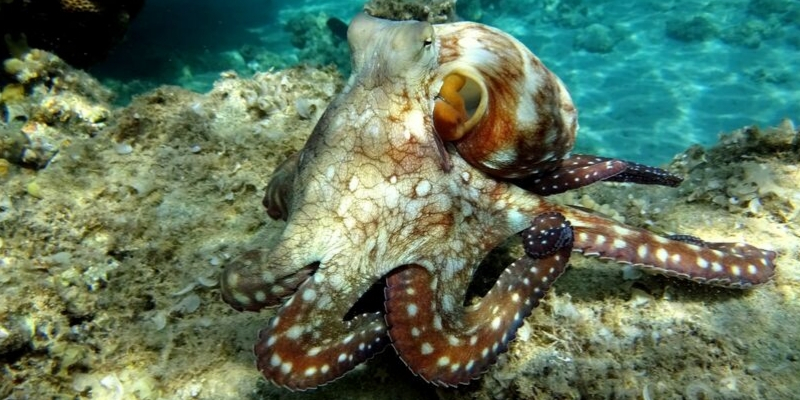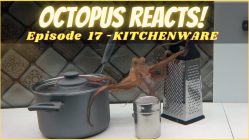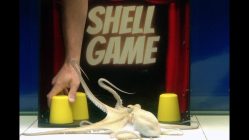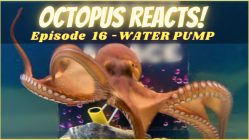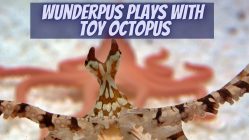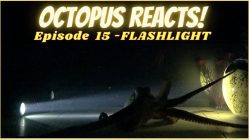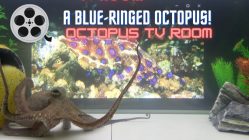If you ever plan on taking an octopus out to dinner, avoid any vegetarian places. Octopuses are unabashed predators. They enjoy hunting and killing what they eat.
What an octopus eats depends on its own size and where it lives.
Size Matters

Pound per pound, octopuses are tough. They can take on prey that is armed with powerful defensive traits, such as crabs. Even dogfish sharks have fallen prey to gutsy and hungry octopuses.
Even so, no matter how brave and audacious an individual octopus is, if one were to measure only a few inches in length, chances are that it wouldn’t fare too well against a shark or an adult blue crab.
The Very Small

As hatchlings, baby octopuses measure mere millimeters. At that size, their diet is primarily conformed of plankton. They may start with nanoplankton progressing to microplankton and mesoplankton as they grow in size.
Smaller octopus species which never grow beyond 10 or 12 inches in length will usually stick to a diet of sea gastropods and other marine mollusks.
The Medium-Sized

Medium-sized species that live in shallow water will have a much more varied diet. Most of these octopuses will show a preference for crustaceans — such as shrimp and crabs — as well as larger gastropods, such as clams and mussels.
The Octopus Vulgaris, or common octopus, falls into this category.
Larger Octopuses

Species of octopus that can reach several feet in length, such as the Giant Pacific Octopus eat much larger prey. They eat small marine creatures as well as larger ones.
On their menu you will find, shrimp, crab, lobsters, a variety of fish, squid, other octopuses, and shelled sea mollusks. They have also been known to capture and eat dogfish sharks measuring as long as four feet.
Diet Based on Location

The biggest factor which determines what an octopus eats is its immediate environment. This is because the 300-plus octopus species that are known to exist throughout the world all evolved specifically to survive in their immediate habitat. By extension, this means that they became adept at hunting other creatures that share their environment.
An example of this would be deep-water dwelling octopuses. These include the dumbo octopuses. These creatures can live at depths exceeding 5,000 feet. Their diet consists of worms, mollusks, and crustaceans which also inhabit those depths.
Are Octopuses Picky Eaters?

If any cat owners are reading this, they are familiar more than most with the concept of finickiness when it comes to the eating habits of certain animals. After all, cats have been known to realize quasi hunger strikes if their owners switched brands of cat food.
Octopuses, in general, are not picky eaters in the sense that they will eat a wide range of animals as has been described above. However, observations do indicate that individual octopuses do express favoritism for certain foods. For example, it is not uncommon to spot octopuses of the same species living in close proximity to each other each seeking out different species of local prey.
Of course, for this to take place the octopuses must be residing in an area which is bountiful in prey. In situations were prey becomes scarce, octopuses do not hesitate to adapt to the prey that is available. In other words, they can be selective about their favorite food but not to the extent of being exclusive when times are tough.
Also, when octopuses are displaced from their normal habitat they will demonstrate an ability to adapt to the new prey found in their new environment. The exception to this is when octopuses are moved to live in captivity.
Octopus Appetite and Captivity

When the process of captivity is handled inappropriately, the octopus will be stressed. If the handling is careless, the creature might be physically injured in the process. This would aggravate the stress that much further. Under those circumstances, the octopus may stop eating until it feels safe in its new environment or it has recovered from its ordeal.
This has led to inaccurate information circulating among octopus enthusiasts that octopuses in captivity experience high incident rates of malnutrition which could lead to illness and even death. This scares some people from considering octopuses as pets.
The reality is that if octopuses are handled with care and attention, they can transition quite well into a captive setting without experiencing eating problems. It is just a matter of reducing the stress on them as early as possible. We have firsthand experience with this. All of the octopuses at Octolab are those which we rescued from local fishermen.
By transferring them into acclimation tanks prior to their permanent residential tanks, the stress levels of our octopuses are reduced quickly. Also, by conditioning their permanent residential tanks to be large and full of safe places for dwelling in privacy, our octopuses never display problems with their appetite.
Watch two of our octopuses competing for one treat
How Do Octopuses Taste What They Eat?

Unlike us humans, octopuses have evolved a very unique and specialized way of tasting. Their sense of taste comes by touching something with their arms. Their suckers have millions of sensory endings which allow the octopus to determine the “taste” of what they are touching.
It is believed that octopuses use taste more for identification than for palette gratification as we humans do. In other words, an octopus will taste something in order to establish what it is and then decide if it is worth eating.
Octopuses do not have taste sensors in their mouths. By the time something makes it to an octopus’ mouth, the octopus has already made a decision that it is worth eating.
Do Octopuses Eat Snacks?
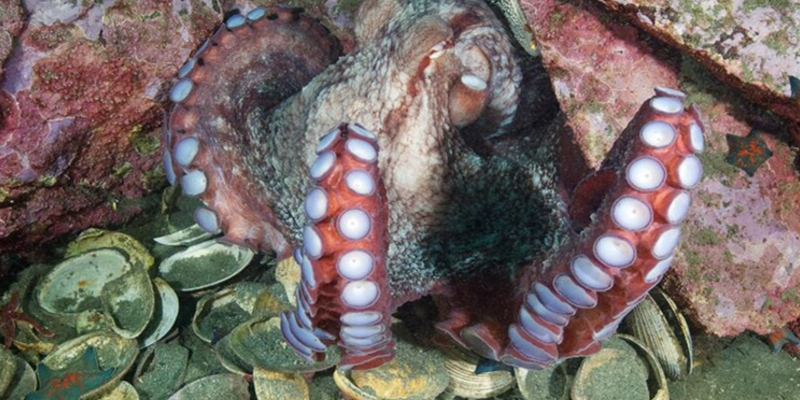
While octopuses will vary their diet based on the availability of prey, they will not deviate from the core elements of their diet. In other words, they will not magically become vegetarians. They will not eat crushed Doritos as some fish are known to do.
Observational studies indicate that octopuses retain “flavor” profiles about what they consider to be edible prey. It is suspected that this “database” of knowledge is instinctual. It is further speculated that it can also be developed and amplified over the lifetime of the octopus as it explores and discovers new types of prey.
Summary of Octopus Eating Habits
In short, octopuses eat crustaceans, mollusks, and fish which share their habitat. While not finicky, they can express favoritism for certain prey in times of abundance.
Now that you know all about the octopus’ dietary preferences, perhaps you would also like to know what eats the octopus.


